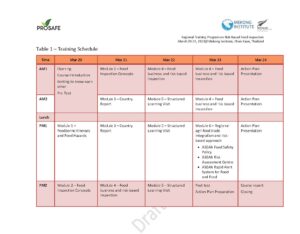
Food regulators and food business operators alike are responsible for ensuring the quality and safety of food placed in the market and along the value chain – from production to processing, retailing and consumption. One of the components of a national food control system is inspection services. Food laws and regulations are meaningless without enforcement. Enforcement requires inspection and market surveillance.
Traditional food inspection focuses on the determination of compliance upon assessment by inspectors of a particular facility. In developing countries and least developed countries, the number of food inspectors is very limited. Most inspection approaches in developing countries focus on correcting current non-compliance and less on preventing future ones. The challenges posed by limited number of inspectors are further compounded by issues related to their technical capacity, availability of tools and also logistical impediments.
Non-compliance is usually dealt with notices, fines or closure of facilities depending on the provisions of the relevant laws. These approaches often do not guarantee that there will not be a recurrence of the violations.
The usual issues faced by food inspectors in developing countries are poor documentation systems; improper personal hygienic and sanitation controls; use of excessive food additives; and non-compliance of premises with good manufacturing practices (GMP). These are the challenges faced by ASEAN Member States (AMS) such as Indonesia. Newer AMS such as Cambodia, Lao PDR, Myanmar and Viet Nam (CLMV) face similar challenges.
CLMV countries are naturally well endowed and the agriculture sector has been their ticket to integration into the global value chain. The sector has been valuable for foreign exchange through exports and some of them have made a name for themselves in the trade of specific agri-food groups such as Myanmar for fish and Viet Nam for rice and peppercorns.
However, the higher prevalence of foodborne diseases results in higher inspection and compliance requirements by importing countries.
Ensuring that the food control system works all the time so that safe foods are consistently produced requires a risk-based approach to inspection and control. Risk factors for food-borne disease are important to be established to facilitate a risk-based approach to inspection.
Challenges in Risk-Based Inspection
Risk-based inspection balances inspection costs and risk by combining people skills and experience with the appropriate technology and tools for inspection. Food-borne disease risk factors are those factors that may cause food-borne disease in consumers if left uncontrolled. Food-borne disease risk factors may be common to many countries and types of foods and food processing operations or unique to a particular country, food or operation because the origin, nature or traditional processing and handling methods of specific food products may differ.
Epidemiological surveillance by health authorities is a primary element in determining risk factors for food-borne diseases by linking food-borne diseases with their origin through investigation of outbreaks. This type of surveillance is lacking in many developing countries and such data is difficult to obtain evident from the International Health Regulations Joint External Evaluation carried out in Cambodia, Lao PDR, Myanmar and Viet Nam by the World Health Organization (WHO).
ASEAN’s ARISE Plus project has implemented food safety capacity-building programs including risk-based inspection. These kinds of programs are in line with the ASEAN Food Safety Policy Principles:
Principle 2: Systematic Risk Analysis Framework
The consistent use of risk analysis principles and scientific advice should be applied at the regional and national levels, and used in the development of food safety control system.
Principle 3: Science-based, Independent Risk Assessment Process
The ASEAN Member States should monitor potential food safety risks, and the prevalence of chemical and microbiological contaminants in food supply to generate information on the nature of these contaminants, their levels and trends to enable taking corrective and preventive measures to protect consumer’s health.
Consultations with national food safety stakeholders as part of the Mekong Institute’s PROSAFE project reiterated the need to strengthen risk-based inspection skills of food safety regulators in Cambodia, Lao PDR, Myanmar and Viet Nam. Programs such as these will contribute to the Initiatives for ASEAN Integration (IAI) and Greater Mekong Sub-region regional economic integration through trade facilitation.
The five-day Regional Training Program (RTP) on Risk-based Food Inspection is funded by the New Zealand Aid Programme (NZAP) and organized by the Mekong Institute (MI). It is aimed at:
- Strengthening the knowledge and understanding of principles of risk-based approach to food inspection
- Strengthening knowledge and application of risk categorization and risk profiling
At the end of the training participants will learn:
- methods and approaches in designing risk-based inspection
- tools for determining risk factors causing food-borne diseases
- tools for risk categorization of food business operators (FBOs)
- to develop inspection plans
The RTP is targeted at representatives of agri-food public and private sectors from CLMV countries. It is particularly useful for food regulators working at border inspection facilities and on sanitary and phytosanitary (SPS) measures. Agri-food private sector representatives will find it useful for effective food safety management at their premises.
The RTP will cover four highly interactive modules i.e:
- Module 1 – Foodborne Illnesses and Food Hazards
- Understanding food risk factors and foodborne diseases
- Understanding food hazards and control in the food chain
- Food chain stakeholders and their roles
- Module 2 – Food Inspection Concepts
- Understanding risk-based approach to food safety control
- What is risk-based inspection?
- Understanding risk categorization and risk profiling in the food chain
- Designing an inspection plan
- Module 3 – Country Report
- Module 4 – Food business and risk-based inspection
- Inspection tools for food establishments
- Food trade and inspection requirements
- Module 5 – Structured Learning Visit
- Module 6 – Regional agri-food trade integration and risk-based approach
- ASEAN Food Safety Policy
- ASEAN Risk Assessment Centre
- ASEAN Rapid Alert System for Food and Feed
- Module 7 – Action Plan
One session will be held for participants to share their national/organizational food safety control or plan respectively.



